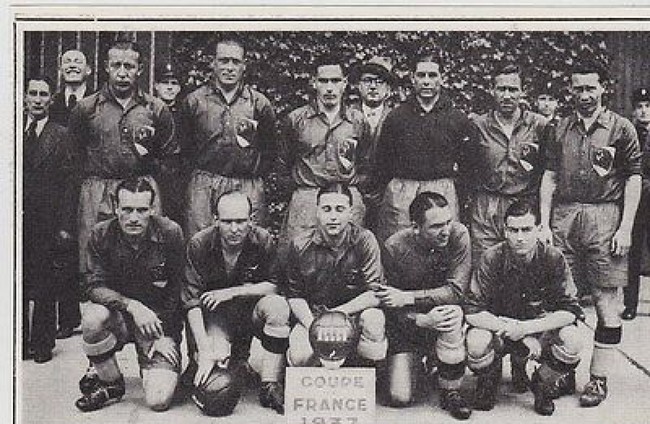IT’S A NEAT brain teaser.
Name the Irish footballer who twice won the French top-tier championship as well as a French Cup.
Tony Cascarino? A decent guess but the titles he claimed with Marseille (1995) and Nancy (1998) were both in the second division.
The answer is Bernard Williams, a man you’ve probably never heard of.
Like so many special Irish athletes who accomplished great things but on foreign sands, his story was widely ignored. He quietly slipped into the shadows and his remarkable tale eventually buried along with him.
Still, it’s important to remember the groundbreaking figures and Williams was just that, the first Irish player to ply his trade in mainland Europe.
Born in Dublin in 1908, his early life – inevitably – remains a mystery. But by the late-1920s, Williams had moved to the south-eastern tip of England and was playing part-time for amateur side Dover United FC. If he was chasing a professional career, he had a lot of ground to make up. Stuck in a football backwater, there wasn’t much in the way of opportunities. However, in 1930, there was a development on the other side of the English Channel that changed Williams life indefinitely.
The French Football Federation had voted unanimously to adopt professionalism, though it wouldn’t be until 1932 that it was formally implemented. At the same time, there was a maximum wage in England of £8 per week for the season and £6 during the summer months. But such arrangements were only for the heavyweights. There was a sliding scale and even the most high-profile stars like Everton’s Dixie Dean and Wolves captain Stan Cullis were seeking to subsidise their pay packets through product endorsement. So, an amateur like Williams could only dream of such a lucrative setup.
However, the French clubs began to talk a good game and very quickly were seen as a genuine threat to the Football League in England. SC Nimes, based in the south-east of the country, were keen to make a splash and approached two Chelsea players, star striker Hughie Gallacher and his fellow Scot, Tommy Law, with a staggering offer. Though the monthly limit was 2000 francs (£21 or £5.25 per week, much less than in England), they would pay the two players an additional sum for coaching the side too. All in, the pair would receive close to £20 per week, blowing their Chelsea wage to smithereens. According to reports, Arsenal attacker David Jack had been offered something similar by Racing Club de Paris.
Gallacher considered the move and spoke openly to the press about his frustrations regarding the maximum wage. But, the Football League retaliated to the various overtures and its president, John McKenna, threatened any player who was seriously contemplating signing with a French team by saying those who headed there without consent would ‘cease to have the right to play again in this country’. Ultimately, that was an empty promise but it did ensure the majority of players, particularly those in the upper echelons, stayed put.
But Bernard Williams, still toiling in Dover, certainly wasn’t one of those. And in 1931, he made the move to France. But it was an inauspicious start.
He arrived to the city of Montbeliard – nestled deep in the east of the country, right on the Swiss border and a place best-known as the home of the Peugeot family. In 1928, Jean-Pierre Peugeot had founded local side FC Sochaux as an athletic outlet for workers at the nearby factory. He felt so strongly about the value of the enterprise that he paid the players for their efforts when professionalism was still a few years away. An ambitious man, he pulled off a major coup in 1929 and hired an English coach, Victor Gibson, who had led Marseille to French Cup wins in 1926 and 1927, to take charge. And when the French professional league debuted in 1932, Sochaux enjoyed an excellent season and only missed out on a championship decider (the winners of two ten-team leagues would reach the final) against Olympique Lillois (precursor to Lille OSC) on goal difference.
It’s not known why Williams ended up in Montbeliard. Perhaps he was so used to the amateur way of life, that the presence of the local Peugeot factory and the likelihood of some work there was a comfort blanket of sorts. And that’s what transpired too. He picked up a job with Peugeot and turned out regularly for another local side, AS Valentigney. But, word got around and Sochaux snapped him up on a pro contract in 1933. According to reports, Peugeot also registered him as an ‘office employee’ to pay him more money, though his factory days were long behind him.
His first campaign was a difficult one as Gibson struggled to emulate the success of Sochaux’s previous season. In a redesigned league format, they finished twelfth from fourteen teams and the manager was unceremoniously dumped.
His replacement was Conrad Ross, a Uruguayan, who initially arrived as player-coach from a club in Geneva. And it proved a smart appointment.
Sochaux were superb and though they claimed the championship by a single point, they were exhilarating to watch, scoring 94 times in 30 games. 59 of those goals came from two players: Andre Abegglen, the Golden Boot winner, and Roger Courtois but Williams offered plenty from midfield and he flourished in his second season, scoring four times in 13 appearances.
After a fourth-place finish the following year, Ross briefly left to take over as coach of Racing Club de Paris but the move didn’t work out. And upon his return, he almost guided Sochaux to a second championship but the team lost out to Marseille on goal difference in 1937. Williams enjoyed his best year yet with nine goals and it still proved a successful season owing to a memorable cup final against Strasbourg.
Footage remains from that encounter and it’s remarkably clear considering it’s from over eighty years ago. Sochaux were behind on the half hour thanks to a goal from prolific German forward Oskar Rohr, who would later be arrested, interned in a former concentration camp and dispatched by the Nazis to the Eastern Front. But Sochaux battled back and after levelling before the break, it was left to Williams to grab the winner two minutes from time, sneaking it at the far post to finish emphatically from close range.
The following season, Sochaux claimed another league title as Williams contributed a couple of goals to the cause and he managed to hit double figures in 1938/39, despite the team struggling to sixth place.
And then, after a magnificent few years, the war came.
Ross, like quite a number of the club’s foreign players, left France. But Williams, by that stage married to a woman he had met in Montbeliard, elected to stay. He enlisted in the French Army and battled the Nazis but the country fell in 1940 and the local Peugeot factory – with its acres upon acres of industrial power, including its own generator, became a lucrative hub of operations for Nazi forces. As a result, it was a target for the Allies and they could count on the support of Rodolphe Peugeot, who provided intelligence. Determined to avoid the deaths of thousands of civilians, he agreed to help with plans to blow up his own factory, which eventually occurred in November 1943.
Once the war ended, Williams – whose best years were behind him by that stage – did return to Sochaux and kept playing with the club until 1947. After retiring, he opened a grocery shop with his wife and remained in Montbeliard – the town that changed his life – until his death in 2004.
Though unknown in his country of origin, Williams – once that part-time player with big dreams in Dover – is a member of the Sochaux Hall of Fame, ensuring his contributions to the greatest period in the club’s history will be remembered forever.
And rightly so.
The42 is on Instagram! Tap the button below on your phone to follow us!












Tiger who?
Woods the one person that knows where he is from not like some claiming they would rather be recognised as another nationality